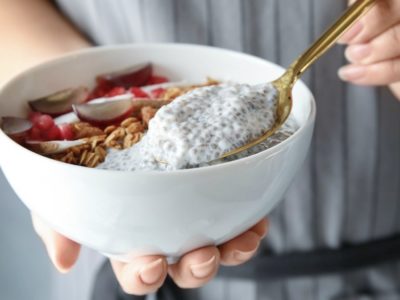Table of Contents[Hide][Show]
Every once in a while, a new “super ingredient” comes along that offers an almost too-good-to-be-true list of benefits. Coconut oil is one of them.
From cooking to skincare to some truly exciting health results, vendors and fans of this superfood loudly proclaim its benefits. And they’re not wrong! Over 1,700 studies show the remarkable effects of coconut oil and how versatile this ingredient can be.
How can you implement the unique properties of coconut oil into your health journey? Let’s dive into its uses and benefits, and discover just why it’s so good for us.
What Is Coconut Oil?
Coconut oil is made by pressing coconut meat to extract the oils. “Virgin” coconut oil is made with fresh coconut meat. Coconut oil labeled as “refined” typically uses dried coconut meat (also known as copra).
Coconut oil should be stored in a sealed container in a cool, dark location (the refrigerator is fine). Its shelf life varies according to how it was made.
- Refined coconut oil typically lasts a few months.
- Virgin coconut oil can last 2-3 years.
Why Coconut Oil Is So Beneficial
One of the reasons for the many benefits of coconut oil is the saturated fats that it contains. Also called MCTs, they make up somewhere between 52% to 85% of most coconut oils.
Where do you begin on the journey to better health by way of MCTs? Let’s explore the straight facts (what on earth is an MCT anyway?) on your new favorite ingredient.
First of all, MCT stands for Medium Chain Triglycerides. Chemically, they get the name from their medium-length tails which are anywhere from 6 to 12 carbons long.
MCTs are digested more easily by the body than other fats, due to their shorter chemical structure. This allows them to be absorbed and used more quickly – they even pass through the blood-brain barrier, unlike other fats.
There are four different types of MCTs and they each do different things for the body:
- C6: Caproic acid. Capra is Latin for goat (which is appropriate as it tastes and smells like goat.) It can also cause digestive issues, even in tiny doses. Many MCT brands out there contain 1-2% of this C6 but it will not read so on the label because of the small amount. How can you tell if it’s in there then? You will either notice a burning sensation in your throat, or you could even experience some diarrhea.
- C8: Caprylic acid. Brands like Bulletproof make Brain Octane oil which are made from 100% caprylic acid, are triple distilled, and only comes from coconut oil (and not Palm oil which most C8’s come from – more on that in a minute.) It also converts to ketones within minutes, which suppresses hunger and fuels the brain. This means more ketones and less digestive distress.
- C10: Capric acid. It’s not as potent as Caprylic acid (it takes longer to raise ketones as it has 10 carbons instead of 8.) You can still get a great mental and metabolic boost from it, though.
- C12: Lauric acid. It behaves like a long chain fatty acid in the body but it’s not actually an MCT. It’s actually half of the fat that’s in coconut oil and much less expensive. Is it bad for you? No. In fact, lauric acid is abundant in a common jar of coconut oil and it’s super antimicrobial too. Pro-tip: get your daily dose of antiviral goodness with a tablespoon of coconut oil a day.
How Is Coconut Oil Different?
Simply put, coconut oil contains different strains of MCTs and is marked by its abundance in lauric acid.
The body behaves differently towards it and while lauric acid is a chemical MCT, the body does not treat it like one. There are several types of fatty acid oils found in coconut oil that behave as MCTs: caprylic acid (6% of coconut oil), capric acid (9% of coconut oil), and lauric acid, which is 50% of coconut oil.
Coconut Oil and Your Health
Coconut oil has been celebrated for its medicinal benefits for thousands of years and the popularity of this superfood continues to prove itself as a wonder for both the brain and body.
Here are just a few of the health benefits of coconut oil.
- Helps with weight loss by increasing body fat loss. In fact, 92% of coconut oil is made up of medium chain fatty acids—the type of fat your body can burn as energy.
- Reduces symptoms of Alzheimer’s disease.
- Has antioxidant properties that helps wounds heal faster as it increases collagen production on skin.
- Acts as a natural antibiotic with its anti-fungal and antibacterial properties which kills yeast and candida.
- Boosts testosterone and balances hormones.
- Improves heart health and reduces LDL cholesterol levels (the bad cholesterol) while increasing HDL cholesterol (the good cholesterol).
In addition, this study showed coconut oil might help with high blood pressure. Researchers at the Biotechnology Center at the Federal University of Paraiba in Brazil tested the effects of daily coconut oil intake and exercise to reduce blood pressure. They studied the effects in rats with hypertension and found coconut oil and exercise training reduced weight gain, and coconut oil supplementation or exercise training seemed to reduce blood pressure.
Co-author Dr. Valdir de Andrade Braga said in a statement:
This is an important finding as coconut oil is currently being considered a popular ‘superfood’ and it is being consumed by athletes and the general population who seek a healthy lifestyle. The possibility of using coconut oil as an adjuvant to treat hypertension adds to the long list of benefits associated with its consumption. Our next step is to start some clinical trials in order to verify whether we can reproduce those findings in hypertensive human patients.
Dr. Valdir de Andrade Braga
Related
7 Great Low Cholesterol Recipes You Can Enjoy At Any Age
These tasty low cholesterol recipes can help keep your heart healthy and your tummy full!
How Much Coconut Oil to Add to Your Diet
If you’re adding coconut oil to your diet for its health benefits, there are several ways to do so. You can use it for cooking or baking, add it to your coffee, tea, or smoothie, or even consume a teaspoon of coconut oil directly.
However, keep an eye on the amount you consume. Despite all of its remarkable health benefits, coconut oil is high in calories and in fat.
- One tablespoon of coconut oil contains 121 calories.
- Dietary guidelines recommend that no more than 10% of your diet be made up of saturated fats, such as coconut oil.
- For the average 2,000 calorie per day diet, this means no more than 200 calories from coconut oil, or roughly 1.5 tablespoons.
Coconut Oil for Your Beauty Routine
We’re all familiar with coconut oil as an alternative for baking — but that’s not the only purpose it serves. Coconut oil has been classified as a superfood because it contains a unique combination of fatty acids that may provide health benefits. The superfood can also be added to your bag of beauty tricks for some natural skincare.
Oral Health
Scientists have found that digested coconut oil serves as a natural antibiotic for tooth decay.
“Incorporating enzyme-modified coconut oil into dental hygiene products would be an attractive alternative to chemical additives, particularly as it works at relatively low concentrations. Also, with increasing antibiotic resistance, it is important that we turn our attention to new ways to combat microbial infection,” said research leader Dr. Damien Brady in a statement.
Skin Care
With its creamy texture, coconut oil can be used post-shower as a lightweight, all-natural moisturizer for dry skin. The tropical scent will linger for hours, so your skin will smell as good as it feels!
Because it’s chemical-free, you can even use coconut oil on the delicate skin around your eyes. Its hydrating results will reduce the look of fine lines and dark circles.
Coconut oil also makes for a fantastic lip balm. Apply it directly to your lips to relieve dry, chapped lips.
If your cuticles aren’t looking as neat as they should, apply coconut oil around the edges of your nail bed. It will soften your cuticles and strengthen your nails, too.
And at the end of the day, coconut oil makes for an easy, effective makeup remover. Warm up a nice-sized scoop of coconut oil in your hand to liquify it. Massage it onto your skin to melt away makeup, then rinse with warm water.
Related
5 Indispensable Tips for Treating Dry Skin
Let’s review 5 tips for treating dry skin—everything from tweaking your self-care routine and environment to eating the right foods.
Hair Care
Coconut oil helps hair damage as it makes an effective hair mask for shiny locks. After shampooing, saturate your hair with coconut oil and let it sit for five minutes before rinsing. It can also be applied to a dry scalp to prevent itching and dandruff.
You can also distribute a pea-sized amount of coconut oil throughout dry hair, especially the ends, for a smooth look. If you feel like your hair can use a frizz-fighting fix boost during the day, you can stash a small jar of coconut oil in your purse or gym bag for touch-ups.
Coconut Oil in the Kitchen
Olive oil has been well studied and proven to bring heart-healthy benefits. The Mediterranean diet’s frequent use of olive oil has been linked to a lower risk of heart disease. So we know all about olive oil, but what about coconut oil?
The long-demonized coconut oil was banished from our pantries due to its high levels of saturated fat. Saturated fat is linked to a higher risk of heart disease which is why we failed to give it a chance.
So, is coconut oil our friend or our foe? Current science suggests that not every kind of saturated fat is bad. In fact, you may be surprised to learn that naturally occurring saturated fat is actually good for you.
It may be hard to shy away from traditional olive oil—after all, it’s been a kitchen staple for centuries—but the truth is that coconut oil is actually better for cooking under high temperatures.
Due to its chemical structure, olive oil is more susceptible to oxidative damage when heated. So, it’s time to embrace coconut oil as the new healthy cooking oil. You won’t regret it!
Final Thoughts
Coconut oil is a wonderful staple to add to any pantry. Its versatility is marked by its body care abilities, medicine cabinet qualities, and cooking benefits.
When it comes to choosing the right coconut oil brand, remember to look for a high-quality, organic, virgin coconut oil. Do your research to find the right brand – one that is made purely and ethically.
Then, determine how you want to implement it into your daily habits. In the kitchen, it can be blended into teas, coffee, and smoothies, as well as used for baking and cooking, so it really boils down to personal preference. For skin care, it will mostly be used topically.
With its versatility and multiple uses, we give coconut oil our stamp of approval!
You May Also Like…
Editor’s Note: This post was originally published on May 21, 2015, and has been updated for quality and relevancy most recently on March 21, 2022.






